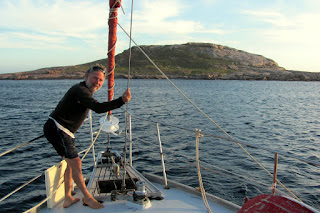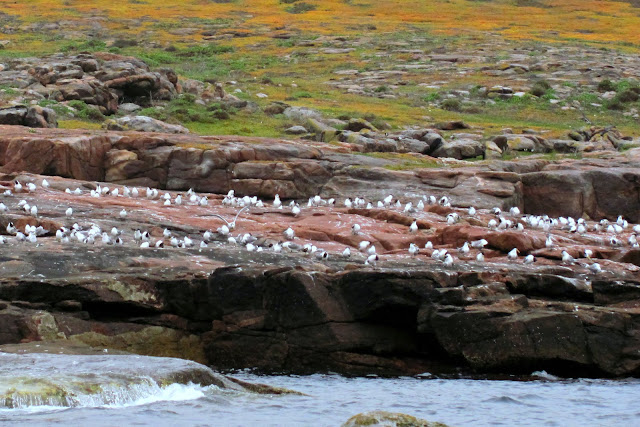 |
| In 1802, Matthew Flinders wrote, "Rocky Islets (Investigator Islands): low, smooth, sterile, frequented by seals" |
Investigator Islands
Facing the Great Southern Ocean, this remote outpost for Nature invited investigation and we planned to anchor there overnight if conditions allowed. Lying 55 miles west of Esperance, and 15 miles from the mainland, the Investigator Islands, originally called Rocky Isles and renamed to honour Flinders' ship, are no more than two gigantic granite boulders rising out tempestuous seas.
 |  |
| Approaching the anchorage | Hard white sand bottom - but very deep |
At first sight, ten miles ahead, while flying a full main and headsail poled out - filled by a gentle breeze, our first since leaving Adelaide eight weeks earlier - we were in seventh heaven. Gazing at the approaching humps gaining colour and taking shape, Jack cleaned a recently caught two-meal tuna while Jude prayed the mild swell would not have much affect in the bay trapped between the islands.
These islands are the furthest west in the Recherche Archipelago which is unsurveyed in many areas. So using the chart as an indicator, we sailed into this bay surrounded by rising granite rock, skirting the shallow patch off its head and then proceeded with caution expecting the bottom to rise suddenly. Looking about, there were no sandy beaches, just steep bare rock all around, so it wasn’t surprising that we had to sink our anchor into great depths.
 |  |
| Cleaning out accumulated Ribbon Grass from anchor locker | Our first sight of Sea Lions. Jude's off to retrieve her camera |
Once settled, our next look about found sea-lions littering the rock slopes. Too late to row around, but we didn’t mind, in half an hour the sun would be melted gold behind black rock, and there was heaps to see from our floating home. A group of what we thought were NZ fur seals were cavorting about in the rocky gap between the two islands, their dark shapes starkly contrasting against the white breaking southern ocean swells seething with foam. Through binoculars, their dripping wet coats reflected the orange glow of the setting sun through which sea-birds were already flying home.
Sea-lions and fur seals slipped off rocks and swam beside us, hand standing under water to wave flippers, and excitedly leapt about in such perfect harmony with the sea while others raised their heads to ask ‘Who’s come to visit our island?’
|
Around us the world is wild, stark, menacing. While downstairs it’s warm, woodsy, cosy. The transition swift, absolute. Upstairs, orange and amber red succulents carpet pink granite massifs that form the backdrop to dark creatures lugging their slug-like bodies up slopes, or posturing, heads aloof, princely, regal, while overhead against scudding darkening grey, forked tailed terns dart, their eyes striped black – inquisitive, hanging perilously aloft on lopping fragile wings.
Life is in abundance – or is it? For an outpost of Nature our experience says there should be more. Memories of dark clouds that became seabirds are replaced by visions of a dotted presence, and sea lions as far as the eye can see replaced by peppercorns scattered here and there. Who took away God’s creatures? Was it global warming? Or did man take their food?
Overnight we were gently rocked to sleep, then kept alert by intensified wind gusts through the gap between the islands, and were awoken early by yelps of seal pups demanding a feed. Over our radio, the forecast is for light winds to increase after noon, already sunny patches have begun peeking through morning cloud, so we quickly moved to launch Little Red and row around for a look. Anticipating a landing, shore going gear was packed, but two attempts were aborted. Once Jack got both feet out the dinghy to stand on slippery sloping rock. He didn’t dare let go else slide into the briny. No choice but to step smartly back in. Immediately after, in perfect unison a swell swept the dinghy away. Lucky him.
 |  |  |
| This old Bull had lost had his harem | This one popped out to say Hi | Some just slept. |
We did get ashore. Jack had seen a nick behind a large rock and chanced rowing us over submerged ones on a surge and came nicely into a perfect harbour no bigger than Little Red. Off the stern we scrambled onto a very flat, dry rock about a foot above the water then hauled Little Red up after us.
First orientation, we looked around, got our bearings, noting what’s close at hand. Two bulls not far away were giving each other stick and their land-lumbering bodies looked as if they could cause damage. Not a good idea to catch one by surprise. During our sortie, with some apprehension we carefully checked behind each rock as we passed. Three or four were curious, or territorial enough to have us back away and allow them their space. And while one mum was taking time off to bathe in an elevated pool, we surprised her pup, unintentionally, and he screamed a frightened yelp from a ledge away from her. Both looked very healthy animals and we hoped they’d stay that way. This is something which plays on our minds, the going ashore on these isolated islands rarely stepped upon.
 |  |
| This mother is taking a beauty bath | Snoozing oblivious to us |
 |
| Crested Terns - Not as many as we expected - whose taking their food? |
Apart from sitting atop the island’s summit to watch Bridled Terns soaring about we touched little and did nothing that could interfere with the islands’ integrity. By sitting still, the terns were soon landing beside us to shelter in the overhang. How great to see them at eye-level just a few feet in front, or on the wind floating like feathers. Down nearer sea-level a flock of Crested-Terns preferred to rest on the smooth granite, and in the far distance a pair of sea-eagles soared above the island on the upswept wind. While watching, one swooped and caught a tern. Then it flew off, each talon clutching a wing, its prey facing forward making it look just like a bi-plane.
Below the islands’ granite tops, in shelter from the worst weather, a thick mat of orange through amber to yellow, pink and green grape-like succulents abounded in delicate purple flowers. These islands have no other vegetation.
So lovely and unique, and filled with the majesty of nature, we spent the full day observing the other creatures live their life, which confirmed yet again that they do pretty much the same as us. Care for their young, find food, investigate life. What joy that brought us. We are one, the wild ones and us. Each wanting the same thing. A future for our kids, and time to observe and enjoy this magical creation.
During winter gales, the sea washes straight over this low shelf. Jude would be in grave danger there.
There is no soil on these rocks, no shrubs grow, no trees, only a colourful succulent can withstand such harsh conditions. Here an old bull, probably another outcast, has taken residence up near the top of the hill.
 |  |
| Surrounded by nature makes us happy | Early morning departure after two days in the wild kingdom |






